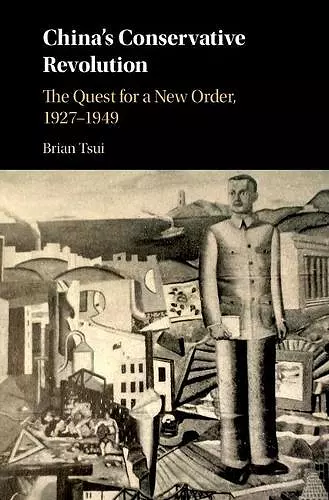China's Conservative Revolution
The Quest for a New Order, 1927–1949
Format:Hardback
Publisher:Cambridge University Press
Published:19th Apr '18
Currently unavailable, currently targeted to be due back around 15th April 2025, but could change
This hardback is available in another edition too:
- Paperback£30.99(9781316647226)

Tsui reveals the peculiarities of the Guomindang's revolutionary enterprise, resituating Nationalist China in the moment of global radical right ascendancy.
Interweaving political, intellectual, cultural and diplomatic histories, Tsui demonstrates how the Guomindang's national revolution turned conservative after the 1927 anti-Communist coup and contributed to the ascendancy of the global radical right. This revisionist reading of Nationalist China will appeal to a wide range of students and scholars.In this ambitious examination of the complex political culture of China under Guomindang rule, Brian Tsui interweaves political ideologies, intellectual trends, social movements and diplomatic maneuvers to demonstrate how the Chinese revolution became conservative after the anti-Communist coup of 1927. Dismissing violent struggles for class equality as incompatible with nationalist goals, Chiang Kai-shek's government should, Tsui argues, be understood in the context of the global ascendance of radical right-wing movements during the inter-war period. The Guomindang's revolutionary nation-building and modernization project struck a chord with China's reformist liberal elite, who were wary of mob rule, while its obsession with Eastern spirituality appealed to Indian nationalists fighting Western colonialism. The Nationalist vision was defined by the party-state's hostility to communist challenges as much as by its ability to co-opt liberalism and Pan-Asianist anti-colonialism. Tsui's revisionist reading revisits the peculiarities of the Guomindang's revolutionary enterprise, resituating Nationalist China in the moment of global radical right ascendancy.
'In this incisive volume, Tsui conclusively demonstrates that the Nationalists' quest for 'capitalism without capitalism' - or fascism - was the central feature of the ideology and organization of the politics of conservatism in China's Republican period. This study is a meticulous work of history; it is also indispensable for our contemporary moment.' Rebecca E. Karl, New York University
'In this study of the 1930s, Brian Tsui reshapes our understanding of the radicalization of Chinese politics and culture. He situates China's 'conservative revolution' in the context of global history, showing how the Nationalists valorized the nation in a language of fascist modernity while forging bonds with anticolonial movements across Asia. If the conservative revolution failed in its own incoherent terms, it nonetheless left permanent marks.' Peter Zarrow, University of Connecticut
'As intellectual biography, Tsui brings to life Dai Jitao, Chen Lifu, Zhu Guangqian, Tan Yunshan, Fu Sinian, Jiang Dingfu, Li Shizeng and Pan Gongzhan as architects of the conservative revolution. … Tsui has written a deeply researched and highly original re-interpretation of political thought during the Chiang Kai-shek era.' Stephen R. Mackinnon, The China Quarterly
'In his book, Brian Tsui expands discussion of nationalism and aesthetics at the core of the conservative revolution, moving from the United Front into the wartime period.' Jeremy Tai, Modern Chinese Literature and Culture
'Brian Tsui's outstanding new book is a welcome piece of scholarship that takes scholars back to the legacy of 1927 … Understanding China's mid-twentieth century revolution in these terms gives Tsui's book a startling freshness. Its contemporary relevance is just one element of its quality; in the depths of its research and complexity and seriousness of its historical insights, it is a deeply significant work.' Rana Mitter, Journal of Chinese Studies
'The book's thoroughly theoretical discussion is a brilliant and inspiring read for those who are interested in modern intellectual currents and political ethics.' Jing Zhang, Twentieth-Century China
'… [Tsui's] subtle treatment of the 'conservative revolution' in theory and practice reveals a fascinating set of connections between Confucian order, mass politics and global change.' Tehyun Ma, The English Historical Review
'The book will be the authoritative work on this for a long time to come.' Edmund S. K. Fung, The China Journal
ISBN: 9781107196230
Dimensions: 235mm x 157mm x 20mm
Weight: 550g
304 pages